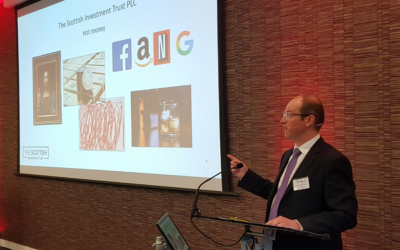12/03/20185 mins
No time for triumphalism
According to the Roman writer Tertullian, victorious generals would employ a servant to stand behind them and whisper “remember you are mortal” lest they get carried away with the pomp of triumphal processions. Investment managers should never be triumphalist, of course, nor should they forget that good times don’t last forever. Tertullian’s warning is particularly pertinent after a period in which global stock markets have soared through successive all-time highs.
With some valuations at dizzying heights, investors should remember that paper returns can prove all too mortal once sentiment shifts. Everything is cyclical and stock market performance is no exception.
Moreover, there are signs today that some shifts are underway. We’ve seen sizeable wobbles in many equity indices since the start of the year, with most developed markets down or flat over that period. Most of last year’s eye-catching gains are still intact, for now, but many investors must be wondering where they should put their money, if the recent volatility heralds a more sizeable downturn.
Alternatives on offer
Since the long recovery from the global financial crisis began, the stock market mantra has been ‘TINA’ – ‘there is no alternative’. An obvious consequence of a world awash with cheap money has been an indiscriminate appetite for equities. Now, however, alternatives are suggesting themselves.
Rising government bond yields are something to watch here, with short-dated government bonds now offering a reasonable – and ‘risk-free’ – return. Short-term US Treasury yields, for example, are significantly higher than in the recent past. The current yield on the two-year US Treasury bill is around 2.3%. It was little more than half that a year ago and well below 1% a year before that. In the UK, short-term gilt yields are still less than compelling, but where the US leads, the rest of the world usually follows. For contrarian equity investors like us, undervalued stocks that have been ignored in the recent rally present more compelling opportunities still.
Another sign that a new period of sobriety is setting in is the collapsing value of cryptocurrencies. With more regulatory intervention looming and investors apparently digesting the implications of an asset that has no tangible fundamentals, it looks as if the Bitcoin boom is over – suggesting that the speculative frenzy is abating.
At the same time, investors have to contend with persistent uncertainties in politics and policy. Despite defeats for populist candidates in European elections last year, populist movements continue to pose potential challenges. The surge in populism that led to Brexit and President Trump’s election may well continue. Electorates weary of austerity or eager for tax cuts encourage politicians to ignore yawning deficits, and debt crises continue to be kicked further down the road.
A reassessment of risk
None of this means that a full-scale stock market collapse is imminent but it may be a sign that investors are starting to consider risk more seriously. As the market climbed last year, risk appeared to be largely forgotten. The default assumption was that the winners would keep on winning and industry-leading companies would remain at the forefront indefinitely. History tells a different story, today’s winners are often tomorrow’s losers. Many companies that are now forgotten were the ‘must-have’ stocks of decades past.
The recent excitement over the technology sector is a case in point here. Although there’s been a fair bit of volatility since the end of 2017, the big US technology stocks have continued to rise in 2018. Investors still seem to have considerable faith in these companies’ invulnerability to cyclical swings or unforeseen disruptions. But things can change and, given time, they always do.
Threats can emerge from new competition or from politics and popular discontent. Managements can be distracted by the allure of non-core businesses and apparently effective business models can conceal fatal flaws. At the same time, companies that have been in the doldrums for long periods can adjust and adapt. In our view, unfavoured companies that are making positive changes offer the best balance of risk and reward.
Ripe for reassessment
We aren’t in the business of speculating about the fates of shares that we don’t hold nor are we claiming any special insights as to the overall direction of the market this year. But in the uncertainty that follows a period of ebullient stockmarket behaviour, we believe that it’s better to be invested in companies that have been overlooked in the excitement and are ripe for reassessment as sobriety settles in.
As contrarian investors, we are in the business of seeking out overlooked and undervalued shares in companies that have been out of favour during the market’s long bull run. Across the centuries, Tertullian warns us to avoid triumphalism. But, as we look for unheralded turnarounds, slow burning transformations and long-term opportunities in unfashionable companies, we are equally aware that we should avoid defeatism too.
Click here to read more from our Spring 2018 newsletter
Please remember that past performance may not be repeated and is not a guide for future performance. The value of shares and the income from them can go down as well as up as a result of market and currency fluctuations. You may not get back the amount you invest.
The Scottish Investment Trust PLC has a long-term policy of borrowing money to invest in equities in the expectation that this will improve returns for shareholders. However, should markets fall these borrowings would magnify any losses on these investments. This may mean you get back nothing at all.
Investment trusts are listed on the London Stock Exchange and are not authorised or regulated by the Financial Conduct Authority.
Please note that SIT Savings Ltd is not authorised to provide advice to individual investors and nothing in this promotion should be considered to be or relied upon as constituting investment advice. If you are unsure about the suitability of an investment, you should contact your financial advisor.



